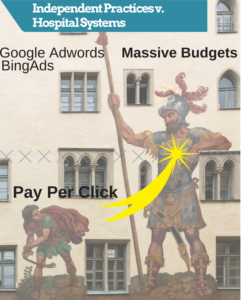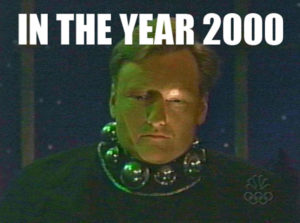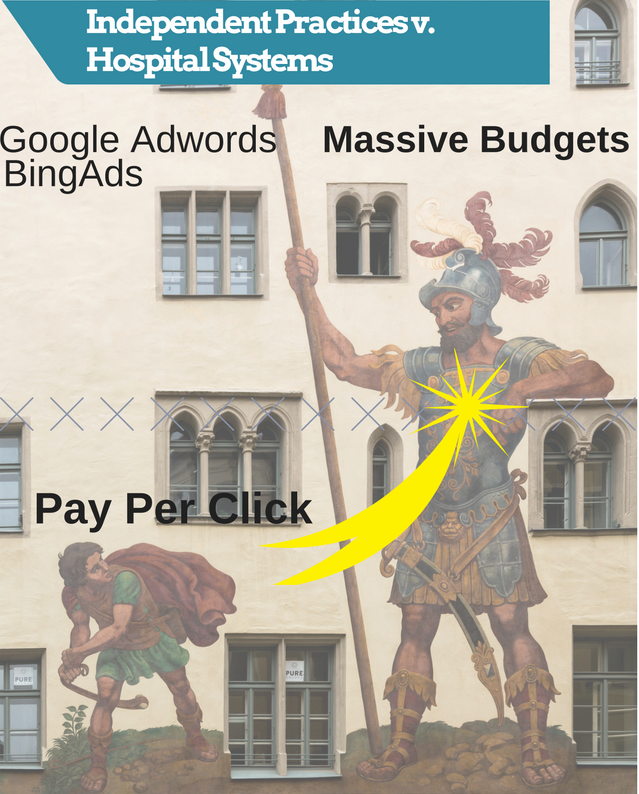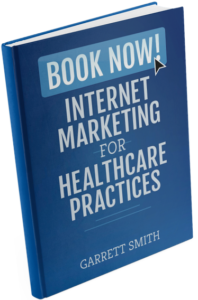Just starting a practice? Or just beginning to market your practice online? Weather you have tried Pay Per Click (PPC) advertising or not, done correctly, it’s a great way to increase patient appointments. PPC simply allows you to help potential patients match their search engine queries to the services practitioners provide.

![]() Adwords = Google’s PPC service.
Adwords = Google’s PPC service. ![]() Bingads = Bing PPC service.
Bingads = Bing PPC service.
Both have very similar benefits, and also very similar features and reporting. At InboundMD we support both, but Google Adwords is by far and away the more significant of the two services. Regardless of the PPC service provider …
Spend Money to Make Money!
A budget of only $300 a month is all you need to get started.
There is $0 entry cost to using PPC services, you can stop at any time, no minimum fee, and unlike in traditional media advertising (television, radio, newspaper, etc), you only pay when someone is interested in your advertisement. Hence the acronym, ‘pay’ ‘per’ ‘click’.
Cost of most healthcare related keywords are relatively cheap at $2 to $3 per click, even in competitive markets like New York City.
With that limited budget of $300, if just a few searchers schedule an appointment, you are very likely to be at least breaking even. At a $2-$3 cost per click that’s 100 interested potential patients that visited your website. Those interested enough can then proceed to fill out their information on a schedule-an-appointment page, or place a phone call to the practice.
And there is plenty of upside left-over…
If your ads are done right, and your website is designed to convert those clicks on your ‘schedule-an-appointment’ landing page, you can certainly expect a higher conversion than ‘just a few’. Consider that many of those who saw your ad, but didn’t click, may have made a phone call simply because your Adwords ad displayed your phone number. Still other searchers may not have clicked, but later on retained your practice information and circled back to the search engine to then type a practitioner’s name or the practice name itself to find your website. Especially if you consider the lifetime value of the patient and the potential for repeat appointments, it’s absolutely realistic to expect to be making more money than you are spending on PPC.
All of these events can be tracked, including the financial metrics. With practitioners and practice managers having full visibility into these numbers.
Maintain Independence: Choice and Leverage!
Control what you can control.
Whether you wish to remain independent, or are looking to be acquired by a hospital system, the more you grow and market your practice, and the more patients you acquire, the more stable and valuable your healthcare practice becomes. This gives you more control and provides you with greater choice in whether or not you remain independent, or if your goal is to be acquired, more leverage when negotiating with the hospital during the acquisition process.
 With the trend of large hospital systems gobbling up an increasing number of independent practices, especially over the past several years (and the many reasons for it) it’s more difficult than ever to remain independence.
With the trend of large hospital systems gobbling up an increasing number of independent practices, especially over the past several years (and the many reasons for it) it’s more difficult than ever to remain independence.
If your goal is to buck that trend and remain independent then you need to be able to compete in a David and Goliath marketing match up. PPC allows your practice and specialties to get top of the page placements along with much larger providers, and due to the possum update you have a fair chance to appear in Google’s search engine equally.
By the way, if anyone out there reading knows the webmaster at MGMA, let me know, so they can get this article better circulated, publishing it on a PDF isn’t the best way. [Re: “…and the many reasons…”]
Now is an excellent time to start using Pay Per Click advertising for your practice!
Here’s why…
Though Google Adwords began way back in October 2000, Healthcare has been slow to adapt to digital marketing and the tools that support it, like pay per click. As mentioned above, keyword prices are currently still very affordable, especially compared to other professional service verticals using PPC.

This means many other competing practices and even hospital systems with huge marketing budgets are still within reach, regardless of your practice size, or how long you have been in business.
The tools have improved significantly and provide more transparency than ever before.
Regardless of the level of competition, regardless of your budget, you are almost certain to see more patients coming to your practice, generating revenue from the procedures you treat, then you are spending spending on clicks.
And the best part is, you don’t have to take anyone’s word for it, because PPC platforms provide highly detailed visibility into the number of clicks, the number of impressions ( that’s the number of time the ad is displayed), the rate of clicks to impressions (called click through rate, CTR), the all important number of conversions (a patient clicked an ad and then filled out an “schedule an appointment” form), and of course your monthly cost. All of these statistics are driven by well researched keywords that among other things are largely based on injuries, conditions, and the resulting procedures and treatments that your practice provides.
We take it a step further at InboundMD and give you a single dashboard that tracks all of this information, along with a number of other statistics: providing tracking on the number of phone calls generated for example specifically resulting from your PPC and digital marketing campaign. This provides practices with a way to hold your InboundMD practice manager accountable, as well as helping to facilitate informed dialogue about what things are working, what aren’t, and what can be done to improve, because if you are not getting results, there is no reason to waste money.
You can fine-tune these campaigns as you continue to learn more.
Your PPC Ads that are triggered by your keywords can be narrowly focused to only display based on your preferences for a particularly successful or lucrative service that you provide, or simply based on the types of cases you prefer seeing, driving only the types of patients and conditions that you are qualified to perform and are successful treating.
SEO Takes Time, Get Instant Traffic with PPC Ads
Remember, new patients are not usually going to know the practitioner’s name, and may not be familiar with the practice name, so they aren’t likely to be typing it into the search engine.
Often times you’ll have a patient who just knows that they are simply hurt, and might be able to describe some of the injury to the search engine.
Though you can certainly match those terms to content on your website (in fact it’s absolutely recommended you do this), it will take 1-3 months for Google or Bing to reindex your site and for the algorithm to become acquainted with your content page, pick up on your targeted keyword phrases and begin to rank it in their search results. Add another 1-3 months and if you are optimizing your website along the way, you should hold a position in the top 5 results on the first page, with the goal of being number 1. PPC on the other hand provides nearly instant top page rankings.
That’s the difference between seeing results in almost half a year, versus half a day!
Besides, long-term, organic website optimization and PPC compliment one another if done correctly. Due to the amount of control, and the speed of results, PPC has the added advantage of allowing you to set up experiments to quickly help you better match what prospective patients are searching for when seeking the services that you provide. Use A/B testing as a way to determine which phrases or words are more likely to generate interest.
Based on this learning, you can actually drive the cost per click of keywords down, as you are finely tuning your services and improving your conversion rate, Google takes that as a sign that you are being attentive and that searchers are looking for you. Because that’s valuable to them, your reward is better keyword pricing which they hope leads to greater spend over time as you see more results.
This is a powerful and objective way to better position your long term, organic, marketing strategy.
Tell us where you are making money, and we can make it work!
InboundMD’s practice marketers will research and optimize for you, we will manage and create your practice’s PPC advertising.
PPC is one major component to a sound digital marketing strategy for your practice, and it’s undoubtedly the fastest way to start gaining traction, generating clicks, conversions, appointments, and phone calls.
We rigorously examine each campaign, look over the metrics, and see if changes we’ve made have been driving results. The goal is to increase clicks, impressions, CTR, Average Position, and goal conversions, while maintaining budget within the constraints of the price of keywords and then driving down the price through actively managing high quality ads.
At InboundMD we have nearly a decade of experience managing PPC for doctors, and our practice marketers have seen first hand the evolution of PPC products during those years. Having an expert working on your campaign, who understands and is capable of maneuvering across a variety of healthcare verticals, helps us with our goal of generating results and having a positive impact on your practice’s investment with us.
Whether you are looking to generate awareness about your practice, create a sense of urgency advocating vaccinations, or promote a new innovative procedure, PPC campaigns managed by a your practice marketer can help by driving focused results delivered to patients in your local area.





